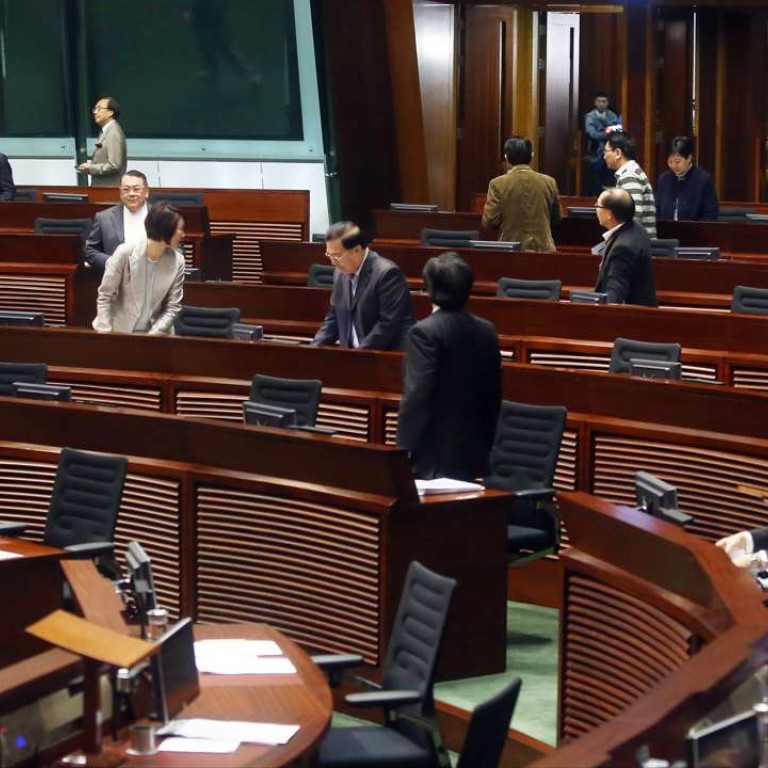
Are the fresh faces of Legco up to all the challenges of lawmaking?
Bernard Chan says what the newcomers lack in experience they make up for in idealism and energy. The question is, can they use these qualities productively?
In 1998, I became the youngest serving member of the Legislative Council. A 33-year-old in Legco was news. Times have changed. Two weeks ago, Hong Kong elected a new Legco. Of the 70 members, 26 are new faces. They represent different political groupings, but the ones grabbing much of the attention are the “localists”. One of the reasons is their age.

Hong Kong’s new localist legislators snub October 1 festivities, calling it just ‘the national day of a neighbouring country’
The youngest are Yau Wai-ching of Youngspiration in Kowloon West and Nathan Law Kwun-chung of Demosisto in Hong Kong Island. Yau, at 25, is the youngest ever woman in Legco. Law, at 23, is the youngest member ever. (The minimum age for election to Legco is 21.)
Both went to Lingnan University, and Law is still a student there. As a former chairman of the university council – and a liberal arts graduate myself – I am pleased that Hong Kong’s youngest ever lawmakers are both from our city’s only liberal arts institution.
I am pleased that Hong Kong’s youngest ever lawmakers are both from our city’s only liberal arts institution
A liberal education should encourage students to study widely, think for themselves, develop good judgment and express themselves effectively. Course choices and class sizes at Lingnan support these aims. Even the residential arrangements on the campus are designed to help all members of the university relate to others and act maturely. I never knew Yau while I was council chairman, but I remember Law very well – he served on the council with me and was head of the students’ union. I hope their liberal arts background will help them in their role as lawmakers.
Many new legislators probably have exposure to a limited range of issues. Localists, for example, may have strong feelings about Hong Kong’s autonomy. Members in the pro-government camp probably feel strongly about ties with the mainland. They will all soon find themselves tackling very different subjects.

Profiles in victory and defeat: a look at a few notable Legco winners and losers
Legislators may be asked to authorise expenditure for new Hong Kong trade offices overseas. They may have to consider government policy on sports – should we encourage elite athletes or put more resources into public sports facilities? They might need to quiz officials about policy on kindergartens or education of ethnic minorities. They will need to think how to vote on subjects like copyright protection or measures to control air pollution. There are no automatic pro-Beijing or pro-democracy positions on these.
They will also have to learn how the council does business. The civil servants who oversee the administration’s Legco business will have their work cut out guiding the newcomers through the process.
Many commentators are saying that this new Legco will be even more divided than in the past – like the community as a whole
Although we see the exciting parts in Legco debates on the TV news, a lot of the work is done quietly in committees. Much effort goes into finding compromises on small details so bigger measures can get through. It is not glamorous, but it is important – members are making the laws the whole community must live by.
The newcomers will have other responsibilities. They must get used to handling requests and complaints from constituents wanting help. New members with little experience of budgeting might have to learn how to spend their office and staff allowances effectively. And, whichever camp they are in, they will need to be aware that there are critics out there waiting to attack them for making any sort of mistake.
Many commentators are saying that this new Legco will be even more divided than in the past – like the community as a whole. There are fears that some of the younger new members will be more radical and unrealistic, or even disruptive, than their predecessors.
We should wait and see. A significant number of voters chose to back younger candidates – from both pro-government and opposition camps – at this election. We can see that as a message of protest. But we can also see it as an expression of confidence in the next generation and a desire for new ideas.
When I entered Legco in 1998, I knew about business and my functional constituency’s industry – and not much else. Over time, I learned more about policy and got involved in issues like food labelling.
The young new legislative councillors may not have wide experience, but they have energy and idealism, and many years ahead of them. Let’s hope they use them productively.
Bernard Chan is a member of the Executive Council

